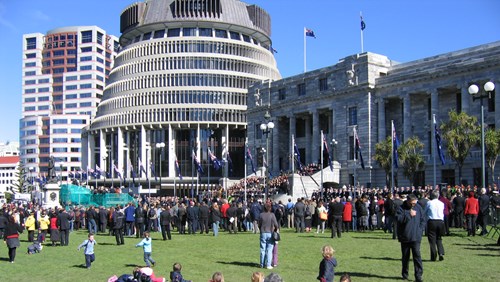
Election Paves Way for Australia’s Human Rights Act
The Albanese government has achieved an historic re-election , substantially building its majority in the House of Representatives. Much has already been written about the potential for a more ambitious legislative program on the back of this result .
That agenda should include substantive human rights reform. The government has the opportunity in its second term to enhance the protections we all deserve by legislating a national Human Rights Act.
Australia presents itself – and is largely ranked – as a global leader in protecting civil and political rights.
It has a strong history of commitment to the UN’s human rights agenda, including as a party to seven core human rights treaties . Australia is also an enthusiastic participant in international human rights monitoring processes, including the Universal Periodic Review .
Yet Australia also receives persistent international criticism , notably in relation to the rights of Indigenous peoples, refugees and asylum seekers.
Australia has a dualist legal system. The Australian government can consent to treaty obligations that are binding on state parties, but those obligations are not absorbed into domestic law. This limits Australia’s capacity to meet its human rights obligations, because many are unenforceable under domestic law.
Instead, Australia has built a patchwork human rights system. The Constitution affords only minimal rights protections , including the right to vote and the right to a trial by jury for certain offences.
Only Victoria, the Australian Capital Territory and Queensland have passed human rights legislation. But state laws do not include comprehensive protection for all the human rights protected by the treaties Australia has signed.
Recently in Queensland, the LNP government rejected the recommendations of a review into the state’s Human Rights Act that would have enhanced the right to adequate housing and the right to be free from gender-based violence.
At the federal level, parliament has a process for human rights scrutiny of legislation, but has not passed a comprehensive national human rights law.
Between 2019 and 2023, the Australian Human Rights Commission conducted a national inquiry, Free & Equal . Its final report recommended major reforms including the passage of a Human Rights Act.
A separate inquiry by the parliamentary Joint Committee on Human Rights also proposed national human rights laws. These inquiries provided model legislation for parliament’s consideration.
A Human Rights Act would remedy gaps in Australia’s compliance with its international obligations. Importantly for Australians, an act would provide comprehensive and enforceable protection for the rights we are all entitled to.
Labor’s national platform notes Australia is an outlier due to its lack of comprehensive human rights legislation. It commits a federal Labor government to:
In its first term, the Albanese government acted quickly to ensure that the Australian Human Rights Commission retained global A-status accreditation. It also conducted the promised parliamentary review into Australia’s human rights framework. However, it is yet to respond to the recommendations of that review.
The prospects of human rights law reform seemed slim in the immediate aftermath of the Voice referendum. The government appeared hesitant to make policy commitments in Indigenous affairs.
Yet Aboriginal and Torres Strait Islander Social Justice Commissioner Katie Kiss argued the referendum outcome highlighted the urgency of reform that would realise “even the most basic human rights” of Indigenous people.
An argument can be made that the values expressed as central to the government’s second term agenda are tightly aligned with the values of the international human rights framework.
In his speech on election night, Prime Minister Anthony Albanese said :
He went on to highlight areas of need to ensure that every Australian has “the opportunity to be their best”, which included:
These are all matters of central concern to the electorate. We may not talk about them all the time in human rights language, but they are also human rights issues.
Australia is a party to human rights treaties that protect fair working conditions , an adequate standard of living and a right to health , women’s rights , the right to education , the rights of people with disabilities and Indigenous peoples , and the right to a healthy environment .
The ground has been laid for comprehensive human rights reform in Australia. This project could unite “Australian values” of fairness and equity with protection of human rights in Australian law.
We all stand to gain from opening our national conversation to human rights principles.
Amy Maguire holds an Australian Research Council fellowship. Her industry partner is the Australian Human Rights Commission.


